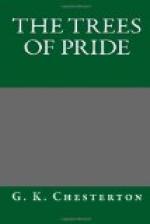“That is the reason,” said the doctor. “I have worked for that for fourteen years.”
They no longer looked at the bare promontory on which the feathery trees had once been so familiar a sight; for they had something else to look at. Anyone seeing the Squire now would have shifted his opinion about where to find the lunatic in that crowd. It was plain in a flash that the change had fallen on him like a thunderbolt; that he, at least, had never had the wildest notion that the tale of the Vanishing Squire had been but a prelude to that of the vanishing trees. The next half hour was full of his ravings and expostulations, which gradually died away into demands for explanation and incoherent questions repeated again and again. He had practically to be overruled at last, in spite of the respect in which he was held, before anything like a space and silence were made in which the doctor could tell his own story. It was perhaps a singular story, of which he alone had ever had the knowledge; and though its narration was not uninterrupted, it may be set forth consecutively in his own words.
“First, I wish it clearly understood that I believe in nothing. I do not even give the nothing I believe a name; or I should be an atheist. I have never had inside my head so much as a hint of heaven and hell. I think it most likely we are worms in the mud; but I happen to be sorry for the other worms under the wheel. And I happen myself to be a sort of worm that turns when he can. If I care nothing for piety, I care less for poetry. I’m not like Ashe here, who is crammed with criminology, but has all sorts of other culture as well. I know nothing about culture, except bacteria culture. I sometimes fancy Mr. Ashe is as much an art critic as Mr. Paynter; only he looks for his heroes, or villains, in real life. But I am a very practical man; and my stepping stones have been simply scientific facts. In this village I found a fact—a fever. I could not classify it; it seemed peculiar to this corner of the coast; it had singular reactions of delirium and mental breakdown. I studied it exactly as I should a queer case in the hospital, and corresponded and compared notes with other men of science. But nobody had even a working hypothesis about it, except of course the ignorant peasantry, who said the peacock trees were in some wild way poisonous.
“Well, the peacock trees were poisonous. The peacock trees did produce the fever. I verified the fact in the plain plodding way required, comparing all the degrees and details of a vast number of cases; and there were a shocking number to compare. At the end of it I had discovered the thing as Harvey discovered the circulation of the blood. Everybody was the worse for being near the things; those who came off best were exactly the exceptions that proved the rule, abnormally healthy and energetic people like the Squire and his daughter. In other words, the peasants were right. But if I put it that




